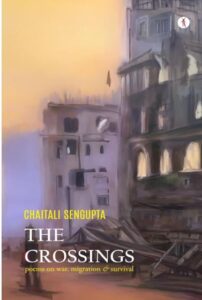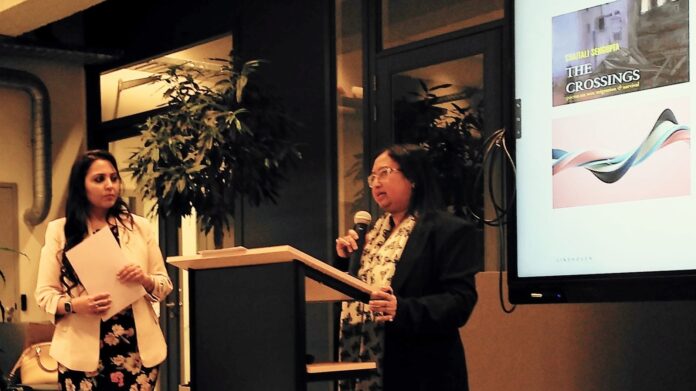The Eindhoven library was the venue where Chaitali Sengupta’s collection of poems was launched, to mark 18 December – International Migrants Day 2023. The collection, called The Crossings, focuses on three themes connected to this topic. These themes are war, migration and survival. The poems present complex thoughts yet their wording allows for easy understanding, Sengupta says.
Radio 4 Brainport producer and presenter Karishma Vij asked Sengupta about the forces that drive her writing. “These poems do not reflect my own lived experience”, she answers. “I am not a forced migrant, but I do feel a close connection to people whose experiences form the heart of these poems. This connection was born when I was a voluneer translator for an organisation called “Vluchtelingen in de knel”.
Undocumented migrants
Vluchtelingen in de Knel (VidK) is an independent foundation committed to the basic rights and needs of undocumented migrants. Sengupta: “I translated documents from Dutch to English and in doing so, heard many stories of war, displacement, persecution or economic hardship. With these stories come images: the cherry trees were blossoming when war broke out in Belgrade. These images are now also in my head”.
Miriam Frosi, CDA councillor, explains how labour migrants still face hardship today, sometimes bordering on modern slavery. Ten per cent of labour migrants face exploitation. That means 5,000 individuals in the Brainport area. Fear generally prevents these migrants from reporting exploitation. Frosi emphasises the importance of exposing these practices. Reporting cases of unfair, unsafe, unhealthy working conditions or labour exploitation on “Meldpunt Arbeidsuitbuiting” means that the inpectorate will investigate cases of malpractice. Frosi also recommends that migrants should learn Dutch in order to become less vulnerable. A second speaker was Manon Rouwette, who spoke about communities as systems.
Displacement
Displacement on a large scale of course also forms part of Sengupta’s country’s history. The partition of India in 1947 caused a massive movement of people whose country had overnight been cut in two along a jagged line. The upheaval it caused would resonate for many decades. Migration and diplacement feature large in many nations’ histories, with the effects echoing through generations.
Hope
Yet these tales of hardship and anguish are not the only dimension of the migrant experience. Sengupta: “Many of the people whose stories I heard inspired me through their impressive resilience. This is why the third section centres on resilience and survival.
To communicate intense human experience, poetry offers the possibility of presenting different realities through an array of voices. Poetry can transform pain into compassion, says Sengupta. “It cannot take away war but it can communicate poetic truths. People have a deep need of poetry when times are hard. When the war in Ukraine broke out, the need for poetry proved strong”.
The Crossings is available through Amazon












